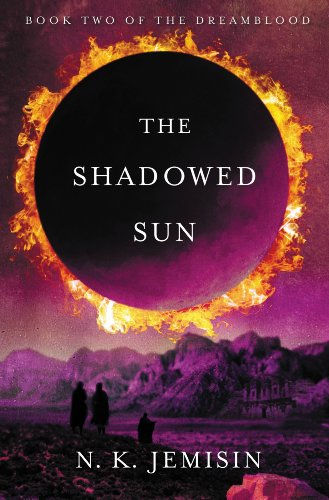Review: "The Shadowed Sun" by N. K. Jemisin
- Claire Quarterman

- Apr 27, 2023
- 2 min read
Updated: May 10, 2023

Quick Summary
Type: Novel, Book 2 in duology "The Dreamblood"
Genre: Fiction, fantasy, thriller
Blurb: "In the final book of NYT bestselling and three time Hugo-Award winning author N. K. Jemisin's Dreamblood Duology, a priestess and an exiled prince must join together to free the city of dreams from imperial rule." Read Time: 4 days
Rating: 4 stars
Review
Note: I am writing this review as I read. There will likely be spoilers.
After three chapters, I am already intrigued by how and why the three different focal characters will come together in the story. The story focuses on Hanani, Wanahomen, Tiaanet, and (possibly) Sunandi and Nijiri. Wanahomen, Sunandi, and Nijiri made appearances in the first book (and Sunandi and Nijiri were focal characters). Now, what's interesting is that Wanahomen and Sunandi seem (at this point) to have switched roles. Wanahomen and his general Charris were loyal to the Prince, and supported his plan to invade Kisua and kill pretty much everyone involved in the battle (including Gujaareh's allies). Sunandi was the force trying to prevent war. Now, given that Wanahomen is a focal character and still loyal to his father, I have to wonder if that doesn't make Sunandi an antagonist. Or will one or the other (or both) realize that their sides are incredibly flawed?
Now, one thing that annoys me - that actually also annoyed me in the last book too - is that in this society that worships a goddess, women are still so oppressed. Hanani, the Sharer-Apprentice is blamed for the death of a child - thus failing a test she actually passed - simply because she is a woman. And Tiaanet, the shunha noblewoman, is clearly being horribly abused by her father (as is her sister and possibly her mother). These two things don't really mesh well with a society that primarily worships a goddess.
I will say, I am really, really hoping that either the blurb is wrong, or Wanahomen has a serious change of heart because so far, I really dislike him and I absolutely don't support him.
I'll be honest, I didn't see the twist at the end of chapter 10. Sonta-i was the more likeable of the two older Gatherers, so for him to die because of this dream is frankly shocking. I honestly had to stop reading to process that one.
The book picked up significantly following Sonta-i's death. I'm still not entirely sure how I feel about Hanani and Wanahomen's relationship (although I am glad Wanahomen reformed and Hanani became more confident). I would have hoped that Hanani's path would have forced the Hetawa to evolve (for example, by allowing her to be a Sharer and Wanahomen's wife). It should also be noted that the circumstances bringing Hanani and Wanahomen together were a bit problematic. But in the end, the story and the ending were all very enjoyable.











Comments